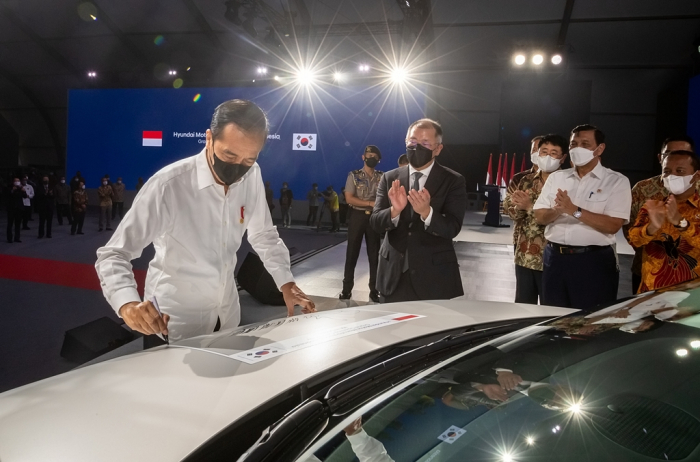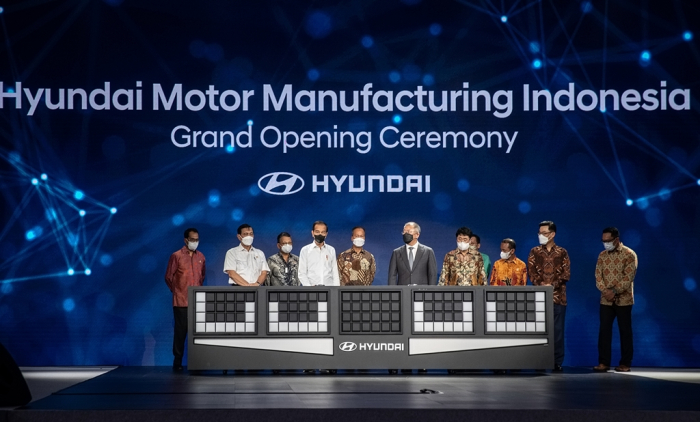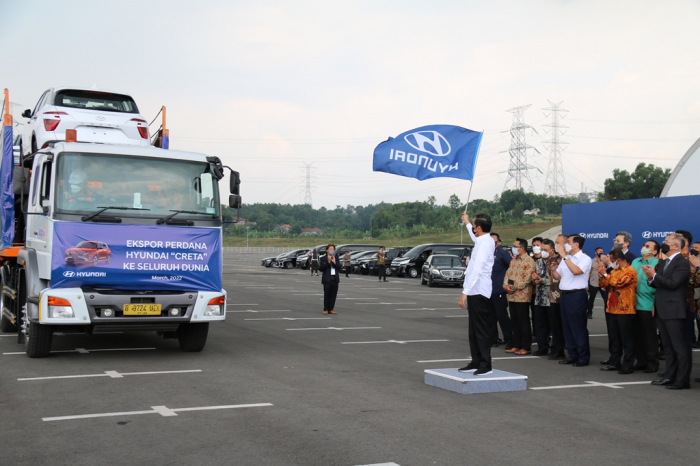Business & Politics
Indonesian president to visit Hyundai Motor during Korea visit
Hyundai has been active in its Indonesian business to crack the Southeast Asian market dominated by Japanese carmakers
By Jul 26, 2022 (Gmt+09:00)
3
Min read
Most Read
LG Chem to sell water filter business to Glenwood PE for $692 million


Kyobo Life poised to buy Japan’s SBI Group-owned savings bank


KT&G eyes overseas M&A after rejecting activist fund's offer


StockX in merger talks with Naver’s online reseller Kream


Mirae Asset to be named Korea Post’s core real estate fund operator



Indonesian President Joko Widodo will visit Hyundai Motor Co. during his upcoming two-day official visit to South Korea as the automaker is aggressively tapping into the Southeast Asian country’s growth potential.
The Indonesian president is due to arrive in Seoul on Wednesday at the invitation of Korean President Yoon Suk-yeol, and start his Korean trip with a business roundtable on Thursday morning with top Korean business leaders, including Hyundai Motor Group Chairman Chung Euisun.
Widodo, popularly known as Jokowi, will have a summit meeting with the Korean president on Thursday afternoon before holding a joint press conference wrapping up his two-day visit.
The Indonesian president is the second head of state after US President Joe Biden to visit Seoul since Korean President Yoon took office in May.
“At the summit, the two leaders will discuss various issues of mutual concern, including cooperation in defense, infrastructure and economic security,” Korea’s National Security Adviser Kim Sung-han said in a briefing.
As part of the Indonesian president’s tour of Korean businesses, he will visit Hyundai Motor’s research center in Hwaseong, near Seoul.

BASE FOR SOUTHEAST ASIAN MARKET
Hyundai has been striving to enhance its presence in Indonesia to tap into the huge growth potential in Southeast Asia. Indonesia, the world's fourth-most populous country, is a high-potential market with about 1 million new cars sold a year, with the current ratio of car ownership to total inhabitants standing at fewer than 100 cars per 1,000 people.
Indonesia also has ample mineral resources such as nickel and cobalt, key raw materials for electric vehicle battery production. The Southeast Asian country is the world’s top nickel producer with the largest reserves.
In March, Hyundai Motor started mass production of its iconic all-electric IONIQ 5 crossover at its newly built plant in Indonesia, which the top Korean automaker plans to use as its base for an aggressive foray into the Southeast Asian market.
With a $1.55 billion investment, Hyundai plans to increase its annual production capacity at the plant in the Deltamas industrial complex in Bekasi Regency, about 40 km east of Jakarta, to 150,000 units by the end of this year, and further to 250,000 cars in the long run.
With the IONIQ 5, Hyundai aims to crack the Southeast Asian market dominated by Japanese carmakers such as Toyota and Honda.
To secure a stable supply of battery cells, Hyundai has forged a partnership with LG Energy Solution Ltd. to build a battery plant in Karawang, Indonesia.

OVERDUE PAYMENTS FOR THE KF-21 PROJECT
During the bilateral summit, the two national leaders will also discuss Indonesia’s overdue payments for the joint KF-21 advanced supersonic fighter jet project, officials said.
Korea’s defense ministry said last week it had successfully completed a test flight of the KF-21 Boramae, becoming the world’s eighth country to develop a homegrown supersonic fighter jet.
In 2015, Indonesia agreed to share 20% of the project cost, or around 1.7 trillion won ($1.3 million). However, it halted making payments in the second half of 2017, citing economic difficulties.
The two countries later agreed that Indonesia will pay in other methods such as palm oil.
A senior Korean government official said he expects the overdue payment issue to be completely solved “in the near future.”
Write to In-Yeop Kim at inside@hankyung.com
In-Soo Nam edited this article.
More to Read
-
 BatteriesLG Energy-led group to set up $9 bn Indonesia battery value chain
BatteriesLG Energy-led group to set up $9 bn Indonesia battery value chainApr 18, 2022 (Gmt+09:00)
2 Min read -
 AutomobilesHyundai to make IONIQ 5 in Indonesia, EV hub for ASEAN market
AutomobilesHyundai to make IONIQ 5 in Indonesia, EV hub for ASEAN marketMar 16, 2022 (Gmt+09:00)
3 Min read -
 AutomobilesHyundai Motor Korea unit to manage Asia-Pacific markets
AutomobilesHyundai Motor Korea unit to manage Asia-Pacific marketsDec 01, 2021 (Gmt+09:00)
3 Min read -
 BatteriesHyundai, LG Energy break ground on $1.1 bn Indonesia battery plant
BatteriesHyundai, LG Energy break ground on $1.1 bn Indonesia battery plantSep 15, 2021 (Gmt+09:00)
2 Min read -
 AutomobilesChinese, Korean carmakers penetrate Japanese-dominated Indonesia
AutomobilesChinese, Korean carmakers penetrate Japanese-dominated IndonesiaAug 30, 2021 (Gmt+09:00)
3 Min read
Comment 0
LOG IN


